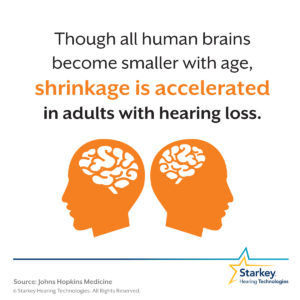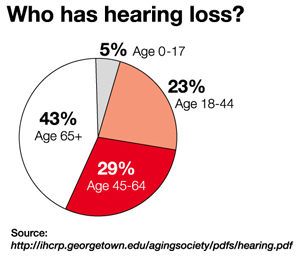The effects may not be obvious…
Hearing loss affects people in different ways. Left undiagnosed or untreated, it can damage communications and erode relationships. Over time, hearing loss may degenerate from a strictly physical condition to a psychological one, which is just one of the reasons it is so important to seek a solution promptly. For most people with hearing loss, there is help. Properly fitted hearing aids improve communication for at least 90 percent of people with hearing loss.
The cause of hearing loss may not be clear…
Hearing loss is not just the result of attending loud concerts or a factor of the aging process. Illness and infections can also play a part in damaging your hearing. A University of Wisconsin Medical School 2001 study[2] revealed that hearing loss occurred in nearly 80% of those who may have suffered from a heart attack. They further determined that individuals who exercised at least once a week experienced a 32 percent reduction in the risk of suffering from hearing loss compared to those who did not work out.
Causes of hearing loss
- hereditary disorders – some types of hearing loss are hereditary, which means parents pass on affected genes to their children. In most cases, hereditary hearing loss is caused by malformations of the inner ear
- genetic disorders – genetic mutations may happen: for example, at the moment of conception when the father’s sperm joins with the mother’s egg. Some of the many genetic disorders that can cause hearing loss include osteogenesis imperfecta, Trisomy 13 (Patau syndrome) and Treacher Collins syndrome
- prenatal exposure to disease – a baby will be born deaf or with hearing problems if they are exposed to certain diseases in utero, including rubella (German measles), influenza and mumps. Other factors that are thought to cause congenital deafness include exposure to methyl mercury and medications such as quinine
- noise – loud noises (such as gun shots, firecrackers, explosions and rock concerts), particularly prolonged exposure either in the workplace or recreationally, can damage the delicate mechanisms inside the ear. If you are standing next to someone, yet have to shout to be heard, you can be sure that the noise is loud enough to be damaging your ears. You can protect your hearing by reducing your exposure to loud noise or wearing suitable protection such as ear muffs or ear plugs
- trauma – such as perforation of the eardrum, fractured skull or changes in air pressure (barotrauma)
- disease – certain diseases can cause hearing loss, including meningitis, mumps, cytomegalovirus and chickenpox. Severe cases of jaundice can also cause hearing loss
- Meniere’s disease and exposure to certain chemicals.
Other causes of temporary hearing loss include:
-
wax – the ear canal secretes cerumen, a waxy substance that helps to protect and lubricate the tissues. A build-up of wax can block the ear canal, leading to short-term conductive hearing loss
-
foreign object – similarly to ear wax, a foreign object stuck inside the ear canal (such as the tip of a cotton bud) can temporarily cause hearing loss
-
excess mucus – the common cold, a bout of flu, hay fever or other allergies can cause an excess of mucus that may block the Eustachian tube of the ear
-
ear infections – including otitis externa (infection of the outer ear) and otitis media (infection of the middle ear). Fluid and pus don’t allow the full conduction of sound.
Other health issues associated with either temporary or permanent hearing loss include the following:
Sluggish or poor blood flow to the ear
High blood pressure
Sickle Cell Disease
Diabetes
Screenings for diabetes and other conditions typically do not include hearing tests. If you have one of these conditions, it’s probably a good idea to ask for a referral to a hearing care professional who can conduct a hearing screening to see if your are suffering from any kind of hearing loss.
Share :
If you have hearing loss, you are not alone. About one in six people experience some degree of hearing impairment over the course of their lives.
The effects may not be obvious…
Hearing loss affects people in different ways. Left undiagnosed or untreated, it can damage communications and erode relationships. Over time, hearing loss may degenerate from a strictly physical condition to a psychological one, which is just one of the reasons it is so important to seek a solution promptly. For most people with hearing loss, there is help. Properly fitted hearing aids improve communication for at least 90 percent of people with hearing loss.
The cause of hearing loss may not be clear…
Hearing loss is not just the result of attending loud concerts or a factor of the aging process. Illness and infections can also play a part in damaging your hearing. A University of Wisconsin Medical School 2001 study[2] revealed that hearing loss occurred in nearly 80% of those who may have suffered from a heart attack. They further determined that individuals who exercised at least once a week experienced a 32 percent reduction in the risk of suffering from hearing loss compared to those who did not work out.
Screenings for diabetes and other conditions typically do not include hearing tests. If you have one of these conditions, it’s probably a good idea to ask for a referral to a hearing care professional who can conduct a hearing screening to see if you are suffering from any kind of hearing loss.
Many other factors can lead to hearing loss, including your family history, repeated exposure to loud noises, injuries, and smoking.
References: 1-World Health Organization. http://www.who.int/mediacentre/factsheets/fs300/en/
2-Torre P 3rd, Cruickshanks KJ, Klein BE, Klein R, Nondahl DM. (2005). The association between cardiovascular disease and cochlear function in older adults. http://jslhr.asha.org/cgi/content/abstract/48/2/473
3-National Institute on Deafness and Other Communication Disorders (NIDCD).

